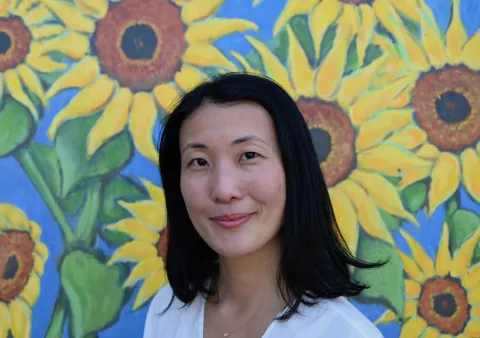"Curiousity is a super power."

Christine Ou
- Degree:
- Doctor of Philosophy in Nursing
- Grad year: 2021
- Program:
- Campus: Vancouver
I started my career as a pediatric nurse. Using nursing school wisdom, I always told the parents of the little ones I worked with that it was important for parents to take care of themselves if they wanted to be able to meet their children’s needs – you can’t give from an empty cup. When I became a parent myself, I experienced firsthand how true this was and how difficult it could be to meet your needs (e.g., for sleep and personal time) while providing 24/7 care for a fully dependent infant. I also learned how our government and communities don’t always support parents to parent optimally. I aim to support parental wellbeing as a means to improve outcomes for children and families through research, knowledge translation, and policy work on promoting healthy sleep to help prevent and manage postpartum mood problems.
Why did you choose to go into your field of study at UBC?
UBC has a renowned School of Nursing. I am lucky to live in Vancouver, where I could study with Dr. Wendy Hall, one of the nursing pioneers of sleep research in Canada.
What has made your time at UBC memorable?
It took me a while to figure out what I wanted to “grow up” to be, even though I was already a registered nurse. Pursuing a doctoral degree at UBC helped me find my people and my life’s work (teaching, research, and knowledge translation). The people I met during my program have enriched my life more than I can describe. This includes my wonderful supervisor, Dr. Wendy Hall, professors and other mentors, my partner Steven, grad students and friends who made this long journey easier and more fun. I am also grateful for many social and structural (e.g., funding) supports at UBC. I’ve also been able to connect and collaborate with local and national organizations such as Pacific Post Partum Support Society, the Canadian Perinatal Mental Health Collaborative, and Niagara Public Health as a UBC Public Scholar; these groups are doing amazing work to support perinatal mental health in Canada.
What advice would you give a student entering your degree program?
Read prolifically. It will help you to have those ah-ha moments and can lead to some great ideas for research. If you plan on having a research career, get access to data as soon as you can and get comfortable with data analysis. As a mentor explained, understanding statistics will change how you think and help you to ask better research questions. Same for qualitative research— the process of doing data analysis will sharpen your skills. Also reach out and find mentors from different places— peers who are ahead of you in your program and outside of your program and mentors in your own discipline and other disciplines. They will add valuable perspectives to your work and life. Last but not least, try not to take yourself too seriously and make time to have fun! Be kind to yourself and others.
Where do you find your inspiration for using your degree to make an impact on our world?
I am continually inspired by the people around me— by nurses, women in applied sciences, mothers, as well as by my partner and kids. I am also in awe of the work that the women at Pacific Post Partum Support Society and the Canadian Perinatal Mental Health Collaborative (which I am so proud to be part of!) have been doing to promote parental mental health and their nonstop advocacy for a national perinatal mental health strategy for Canada. I believe that happy and healthy parents are more able to raise happy and healthy children. To be happy and healthy, parents and children need good quality sleep. Better outcomes for families are what drive my focus on perinatal mental health.

